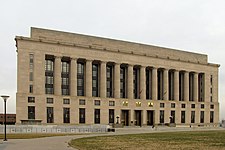Davidson County, Tennessee
| Davidson County, Tennessee | ||
|---|---|---|

Davidson County Courthouse in Nashville
|
||
|
||
|
Location in the U.S. state of Tennessee |
||
 Tennessee's location in the U.S. |
||
| Founded | October 6, 1783 | |
| Named for | William Lee Davidson | |
| Seat | Nashville | |
| Largest city | Nashville | |
| Area | ||
| • Total | 526 sq mi (1,362 km2) | |
| • Land | 504 sq mi (1,305 km2) | |
| • Water | 22 sq mi (57 km2), 4.2% | |
| Population (est.) | ||
| • (2015) | 678,889 | |
| • Density | 1,326/sq mi (512/km²) | |
| Congressional district | 5th | |
| Time zone | Central: UTC-6/-5 | |
| Website | [1] | |
Davidson County is a county located in the U.S. state of Tennessee. As of the 2010 census, the population was 626,681, making it the second-most populous county in Tennessee. Its county seat is Nashville, the state capital.
In 1963, the City of Nashville and the Davidson County government merged, so the county government is now known as the "Metropolitan Government of Nashville and Davidson County," or "Metro Nashville" for short.
Davidson County has the largest population in the 13-county Nashville-Davidson–Murfreesboro–Franklin Metropolitan Statistical Area. Nashville has always been the region's center of commerce, industry, transportation, and culture, but it did not become the capital of Tennessee until 1827 and did not gain permanent capital status until 1843.
Davidson County is the oldest county in the 41-county region of Middle Tennessee. It dates to 1783, when the North Carolina legislature created the county and named it in honor of William Lee Davidson, a North Carolina general who was killed opposing General Cornwallis and the British Army's crossing of the Catawba River on February 1, 1781. The county seat, Nashville, is the oldest permanent European (white) settlement in Middle Tennessee, founded by James Robertson and John Donelson during the winter of 1779-80. The first white settlers established the Cumberland Compact in order to establish a basic rule of law and to protect their land titles. Through much of the early 1780s, the settlers also faced a hostile response from Native American tribes who resented their encroaching on their territory and competing for resources. As the county's many known archaeological sites attest, Native American cultures had occupied areas of Davidson County for thousands of years. The first whites to enter the area were fur traders. Long hunters came next, having learned about the large salt lick, known as French Lick, where they hunted game and traded with Native Americans.
...
Wikipedia

